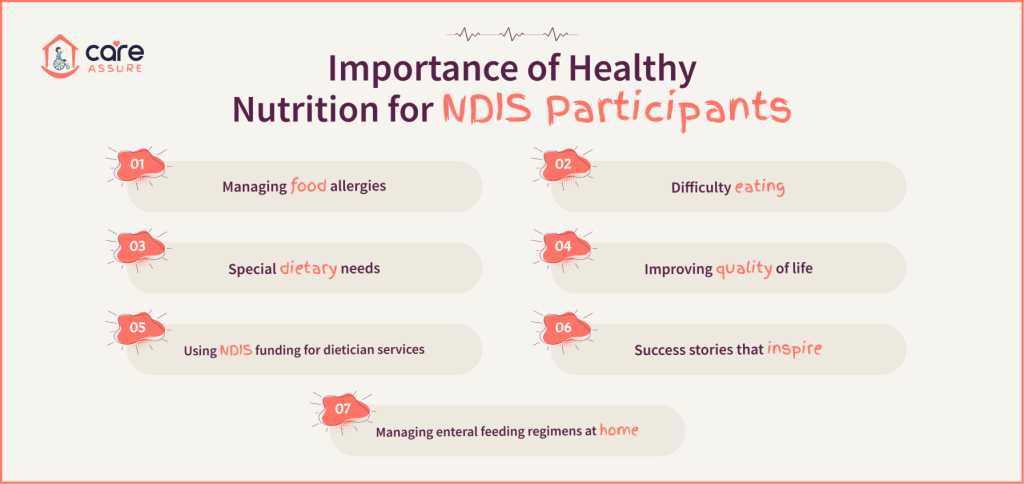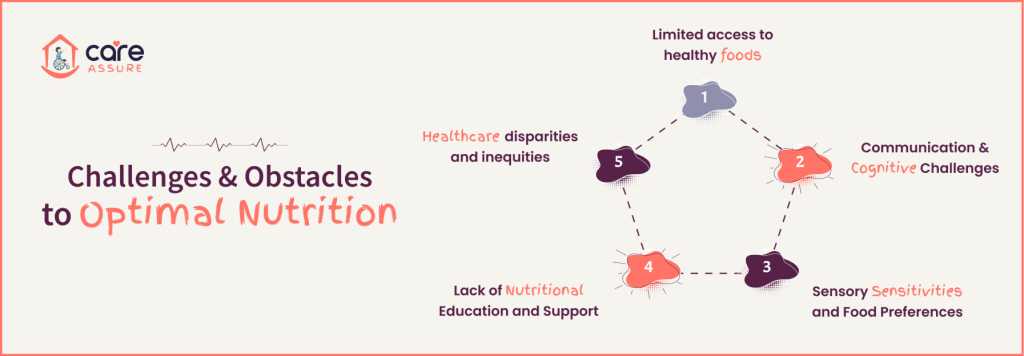The Role of Nutrition in NDIS Participant Well-Being
March 27, 2024
|By Careassure
|7 min read

People have used medicine, therapy, treatments, and surgery to ease the physical and mental effects of sickness, disease, and many types of disabilities. However, eating is an area that many people have forgotten to include in their plans to improve the health of people with disabilities. Nutrition research in the 21st century has given us important knowledge about how different foods and diets affect people's health. One of the best ways to improve the quality of your life, stop more health problems, and even get healthier is to understand and use the latest studies on nutrition and diet, especially regarding health and disability.
Understanding nutrition in the context of disability
Individuals with impairments often confront specific nutritional issues. Mobility constraints, sensory sensitivities, cognitive disabilities, and medical issues can all substantially impact dietary choices and nutrition. Furthermore, socioeconomic characteristics, resource availability, and support network can influence NDIS members' food patterns.
It is critical to understand that nutrition is more than just food intake; it also includes the body's ability to properly use nutrients, maintain optimal health, and prevent disease. Nutrition is important for people with disabilities because it helps them manage their health conditions, promotes growth and development, increases energy levels, and supports overall well-being. impacts
Importance of healthy nutrition for NDIS participants
Here are reasons NDIS participants should take their nutrition seriously:

1. Managing food allergies
Food allergies can be significant and difficult to treat. A dietitian can help you discover particular food allergies and sensitivities, ensuring your diet is safe and balanced. They teach you and your support networks how to read food labels, choose allergen-free options, and plan a diet that meets nutritional needs while avoiding allergens.2. Difficulty eating
You may have difficulty eating owing to physical, sensory, or cognitive issues. A dietitian can develop adaptive techniques to help people control their eating habits. This could include developing new textures or discovering more nutrient-dense foods that are easier to digest. They work with participants, caregivers, and healthcare experts to address the individual's nutritional needs, regardless of their eating challenges3. Special dietary needs
Diabetes, celiac disease, and renal abnormalities are all medical diseases that may necessitate particular diets. A dietitian develops personalised nutrition regimens that meet these individual needs while delivering important nutrients. They monitor blood sugar, electrolytes, and other important parameters to improve health outcomes4. Improving quality of life
The advantages of working with a dietitian go beyond physical wellness. Proper diet significantly impacts mental health, energy levels, and life pleasure. A diet suited to your specific needs can improve your mood, cognitive function, and energy levels, allowing you to fully enjoy life. For many people, the most important benefit of NDIS-funded dietician services is an improved quality of life.5. Using NDIS funding for dietician services
The NDIS recognises dieticians' critical role in assisting people with disabilities. Participants can utilise their funds to get dietician services, making this important assistance available to people who need it the most. This cash can be used for consultations, personalised meal planning, nutritional education, and continuing support to ensure that dietary goals are met and maintained.6. Success stories that inspire
The benefits of including a dietitian in your care plan might be life-changing. Many NDIS members have shared their success stories, including improved health, more independence, and stronger control over their well-being. These stories demonstrate the transforming effect of an individualised diet.7. Managing enteral feeding regimens at home
Some NDIS participants may need enteral nutrition. This procedure is commonly employed when people have trouble ingesting or absorbing nutrition orally. Dietitians are critical in establishing and implementing enteral feeding programs matching the participant's nutrient needs. They work with healthcare experts, caregivers, and participants to ensure that the enteral nutrition formula is suitable, well-tolerated, and meets dietary preferences. Regular monitoring and modifications are made to avoid problems and improve nutritional status.Challenges and Obstacles to Optimal Nutrition
Despite the importance of nutrition for NDIS participants, several problems and hurdles may prevent access to nutritional foods, dietary support, and education. Some of these challenges are:

1. Limited access to healthy foods
Individuals with disabilities may have difficulty acquiring fresh, healthy foods owing to mobility limits, transportation challenges, financial constraints, and geographic location.2. Communication and Cognitive Challenges
NDIS participants with speech or cognitive disabilities may have difficulties understanding nutrition-related information, making informed food choices, and adhering to dietary guidelines.3. Sensory Sensitivities and Food Preferences
Some people with disabilities have sensory sensitivity or special dietary preferences, which can influence food selection and meal preparation. Managing these tastes while maintaining enough nourishment might be difficult.4. Lack of Nutritional Education and Support
Caregivers support workers, and healthcare professionals may need additional training and resources to provide personalised nutrition education, meal planning assistance, and dietary support to NDIS participants.5. Healthcare disparities and inequities
Disparities in healthcare access, cultural attitudes, and socioeconomic status can all contribute to inequities in nutrition services and support for people with disabilities.Conclusion
Investing time learning about certain meals and their nutritional worth or effects can help you become an active participant in improving your life as a disabled person. Nutrition is critical to the well-being of NDIS participants, affecting health outcomes, everyday functioning, and overall quality of life. We can empower people with disabilities to flourish, reach their full potential, and live satisfying lives by recognising the importance of nutrition, removing obstacles to access and support, and using evidence-based practices. We can create a healthier, more equitable future for all NDIS participants by working together and being inclusive.
Frequently Asked Questions (FAQs)
Proper diet is associated with various health outcomes, including weight control, blood sugar regulation, cholesterol levels, immunological function, and chronic disease prevention. Maintaining optimal health is critical for NDIS members who want to maximise their independence and quality of life.




